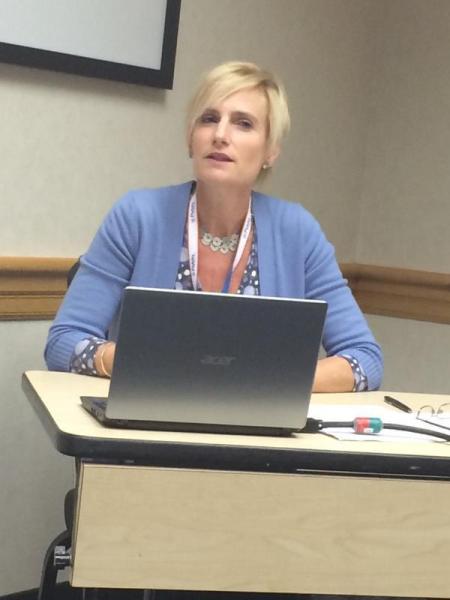Below you can find my post on the Digital Epiphanies blog about the workshop that was organised during MobileHCI. My paper “I check my emails on the toilet”: Email Practices and Work-Home Boundary Management” was presented by my supervisor, Dr Anna L Cox, as I was attending the Doctoral Consortium at the same time.
On Sept. 23rd 2014 we held the “Socio-Technical Systems and Work-Home Boundaries” workshop during MobileHCI conference in Toronto, Canada. This workshop was one of the outcomes of our Digital Epiphanies project, in an effort to open up the discussion to a broader range of researchers in the field of technology and work-home boundaries. Among the attendees were human-computer interaction (HCI) specialists, social scientists, and sociologists. The workshop was divided into three parts: first, all papers were presented (see the workshop program for the list of papers), each followed by a short Q&A session.
Dr Natasha Mauthner presenting her paper, “Technology and the (re)making of work and family”
Secondly, a discussion was moderated around three broad topics:- Our definition of key terms such as ‘home’, ‘work’ and ‘boundaries’?
- The methods most commonly used?
- Non-use of technology and work-home boundaries?
As far as methods adopted, there was more of an overlap. This showed that observations, interviews and questionnaires were commonly used, especially in situ. Quantitative data was also collected (e.g. screenshots of devices) and additionally HCI researchers conducted also more controlled studies in the lab. However, more research should consider non-use of technology as an informant of how technology is interweaved in our everyday lives. Non-use of technology can refer to holidays or periods abroad, where Internet connectivity can be costly, but it can also refer to unavailability of technology. For example, Becky Faith from the Open University studies how socially excluded women use technology. Because the majority of them are homeless, they don’t necessarily always have an opportunity to charge their smartphone’s battery or put credit on it. Natasha Mauthner, from Aberdeen University, instead talked about how young teenagers might not be allowed a mobile phone, but then are given one without a SIM card to use merely as an alarm clock. These perspectives emphasise the different reasons for non-use that particular users encounter and that need to be taken into consideration. If we only consider how technology is used to shape work-home boundaries, we might be missing out on important information provided by non-use. It is clear the role of technology in work-home boundaries is topical and frequently discussed in popular media (e.g.http://bit.ly/1rURSzN). For this reason the last part of the workshop was directed towards producing a special issue proposal. With such publication we hope to bring together researchers from relevant fields to contribute and extend our understanding on technology and work-home boundaries.
Dr Rowanne Fleck presenting her paper, “Balancing Boundaries: The Role of Technology Boundary Work in Managing Work-Life Balance”





0 Comments